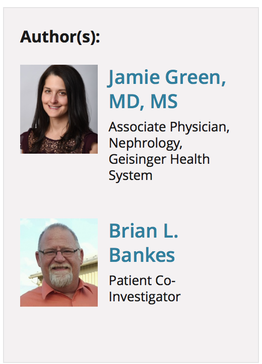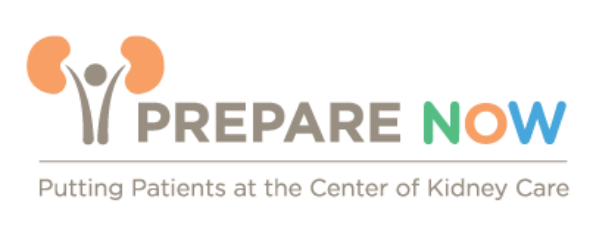 We are thrilled that our study was recently featured in a PCORI blog in observance for National Kidney Month. Read the post below or see on the PCORI site here. Chronic kidney disease is part of daily life for more than 20 million adults in the United States, according to the Centers for Disease Control and Prevention. Over time, this condition can develop into kidney failure, leaving patients to face a difficult choice among treatment options. About 680,000 Americans receive treatment—one of two types of dialysis or kidney transplant—for kidney failure, according to the US Renal Data System. Patients often get diagnosed in an emergency department, and they must choose a treatment approach under highly stressful circumstances. One thing they don’t typically receive is support to make an informed decision. In a PCORI-funded study, researchers at Duke University in North Carolina and Geisinger Health System in Pennsylvania are working to change that. They are testing a program that adds a kidney transition specialist to the healthcare team. The specialist helps patients with decision making, coordinates care among various clinicians, and teaches patients about kidney disease and self-care. New tools help the specialists recognize patients at risk of kidney failure earlier, so they can help patients make informed treatment decisions before they find themselves in the emergency room. The research team will compare how patients do when they receive this patient-centered kidney transition care versus usual care without the specialist. In observance of National Kidney Month, we spoke with nephrologist and co-principal investigator Jamie Green, MD, MS, of Geisinger Health System, and former clinical engineer Brian L. Bankes, a patient co-investigator who has kidney disease and works as a patient advocate for organizations including the National Kidney Foundation. PCORI’s Kidney Disease FocusPCORI has funded 12 research projects, totaling $32.7 million, related to kidney disease. These include a project comparing the safety and effectiveness of drugs for extended treatment of blood clots in patients with kidney disease and one testing home-based versus clinic care for a Native American tribe with high rates of kidney disease. (See related story, Home-Based Care for Chronic Kidney Disease.) For more information, see our fact sheet and a list of kidney disease projects. PCORI and the National Kidney Foundation will take questions from the public during a Facebook Live event about the need for patient-centered research on kidney disease on March 22. Why is a study about kidney care transitions so important?Jamie Green: When patients are diagnosed with kidney failure, it’s alarming. We’ve done focus groups with patients and their caregivers, and they all say they felt blindsided by the diagnosis, and the fact that dialysis could be in their future. Without a form of kidney replacement therapy—dialysis or a transplant—kidney failure causes death. There’s a knowledge gap here: no one knows how best to support patients when they transition from kidney disease to kidney failure. We don’t do a good job of preparing patients because it’s hard to predict which patients will progress to kidney failure. We wait way too long to have the conversation. Our goal is to provide the right support to patients so that they can be educated early and be ready for that transition, and make informed decisions about their treatment that are consistent with their values. Brian Bankes: Back when I was diagnosed with kidney failure, 30 years ago, I went into the hospital with the assumption that I had a chest cold. I had so much congestion that I couldn’t breathe when I tried to lie down at night. Within hours, I was put on dialysis. The doctors said if I had fallen asleep, I would have drowned from having so much fluid in my lungs, all because my kidneys weren’t working. It was a shock. And then, figuring out what kind of dialysis I would take—it was a lot to process. I didn’t have information on hand to help me make my decisions. "There's a knowledge gap here: no one knows how best to support patients when they transition from kidney disease to kidney failure." But can you predict which patients with kidney disease will experience kidney failure?
Jamie Green: In the study, we’re using a web-based tool that helps us predict a patient’s two-year risk of progressing to kidney failure based on several risk factors. This information allows us to target high-risk patients, so that we can test providing the highest-risk patients with support and giving doctors an opportunity to have early conversations with patients about treatment options. Why is it better for patients to make treatment decisions early? Jamie Green: It’s not only good from patients’ psychological perspective, but it also allows them to better prepare medically. For example, if you want to do hemodialysis, the type of dialysis that cleans the blood using a filter that acts as an artificial kidney, doctors would put in a fistula early. A fistula is a connection between an artery and a vein that lets the filter connect to the blood supply. If you start dialysis in an emergency situation, you would receive a catheter instead, which would increase your risk of infection and even death. If we can identify patients who want a transplant instead of dialysis, then we can get them on the organ transplant list earlier. The earlier you get on the list, the better your chances of finding a matching donor. It can really save lives. How have patients influenced the study? Jamie Green: Our patients have been involved in all aspects of the project. For example, they helped us design our study brochure’s language and images. Recently, we were discussing how we want to refer to a patient’s loved one. We went to the patients and asked them. The patients all felt that caregiver is how they define their partner or spouse. So, we are using that term. Brian Bankes: Kidney disease doesn’t affect just a single person. It affects the whole family. My wife takes care of me during home hemodialysis, which I do five times a week. She needs information and support, just like I do. Jamie Green: Patients also felt that having contact with patients who are already on dialysis would be extremely helpful. So we are partnering with the National Kidney Foundation to provide peer mentors to the participants in our study. Brian Bankes: I’ve learned a lot in the past 30 years about kidney disease and types of dialysis. That’s why when I found out I could help other patients, I jumped at the offer. I’ve had two transplants—one in 1987 that lasted 15 years, and one in 2005 that lasted for 4 1/2 years—and I’ve been on all three types of dialysis. I enjoy attending the study work groups because as a patient, I get to voice my opinion. That’s a big reason for the study: to get patients more involved in their health care.
ACADIA HOSPITAL
9/25/2017 02:16:57 pm
Our hospital is urgently in need for kidney donors with awarded amount of $420,000.00 USD. Interested donor should kindly contact us via our direct email: [email protected] OR whatsapp: +1-858-492-0091 Comments are closed.
|
Archives
September 2020
Categories |

 RSS Feed
RSS Feed
